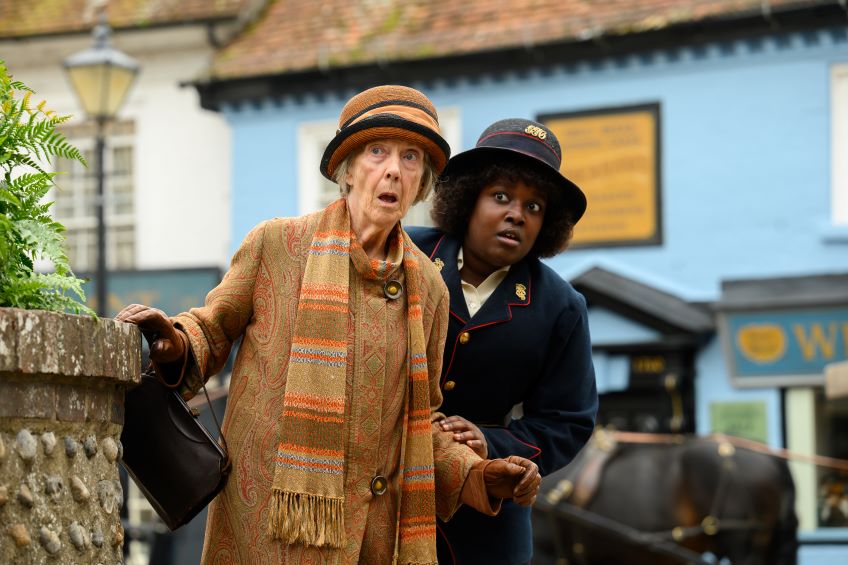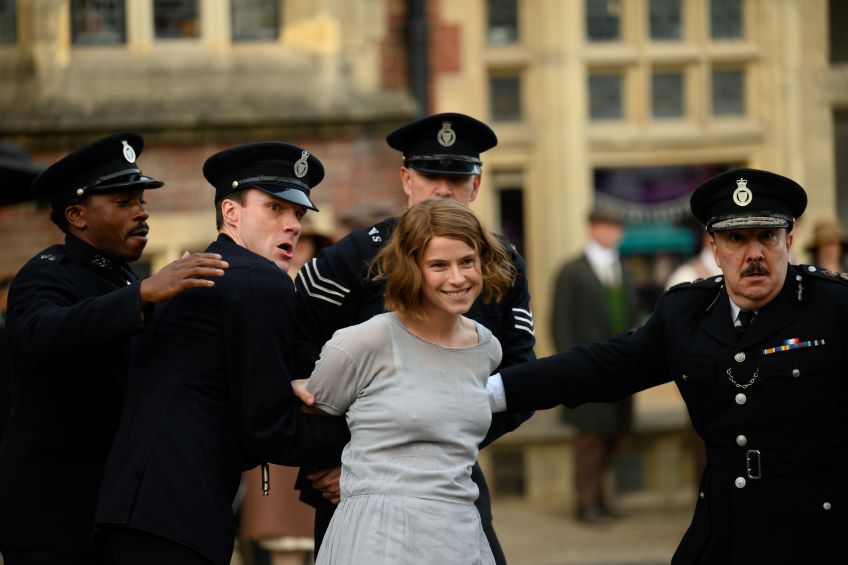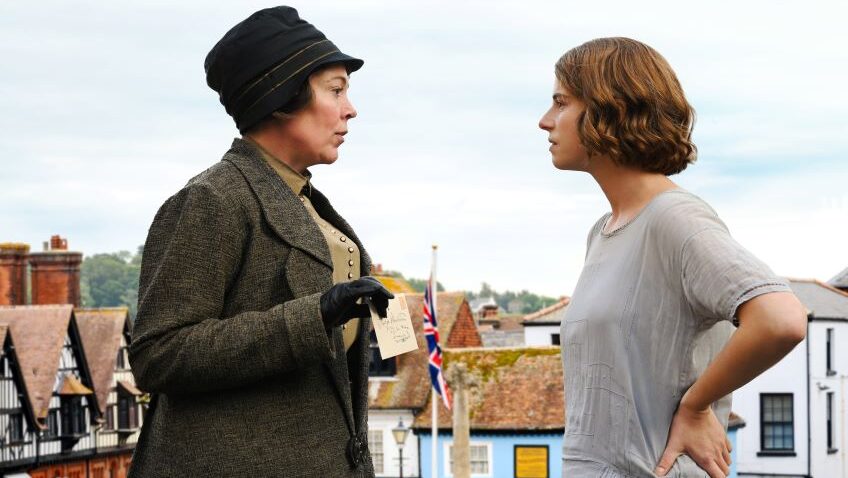Joyce Glasser reviews Wicked Little Letters (February 23, 2024) Cert 15, 100 mins. In Cinemas
When a film featuring a best of British cast headed by Olivia Coleman (The Favourite), Jessica Buckley (Wild Rose, Women Talking), Timothy Spall (Mr Turner, Secrets and Lies), and Gemma Jones (the Harry Potter and Bridget Jones films), is based on the 1920’s equivalent of the Rooney vs Vardy Wagatha Christie trial, it has to be fun and entertaining. Director Thea Sharrock’s (Me Without You) period comedy Wicked Little Letters is just that, but the promise of something more dries up in the second half.
Edith Swan (Colman), middle-age, conversative and single, cowers under the strong thumb of her upright, Bible spouting father (Spall) and her passive mother (Jones) who is bound in a moral strait-jacket. Edith’s only social life is through the Church’s Whist Club, but she hasn’t any real friends. Though dependent on her parents, even Edith is beginning to feel the set-up is more for her parents good than hers.
When rowdy Irish émigré Rose Gooding (Buckley) moves in next door with her ten-year-old daughter Nancy (Alisha Weir), her guitar-playing Black WWI veteran boyfriend, Bill (Malachi Kirby), and her colourful vocabulary of four-letter words, Edith’s feeling of restlessness grows. The two neighbours form a tentative friendship based more on the curiosity of opposites-that-attract than on shared values.

Edith is fascinated by, and a bit envious of, Rose’s fun-loving, freewheeling life style, but appears appalled that she swears like a sailor and head-butts a judgmental older man in the local pub. Rose says what she thinks, and has no time for Church, authority or posturing, while Edith is so repressed she can only react to Rose as she is programmed to by her father.
So when Edith receives a series of profane letters, and appears shocked and offended, the finger is pointed at Rose. The proof is in the pudding, and when Rose fails to curb her language when “interrogated” by the stereotypical Constable Papperwick (Hugh Skinner), she is charged, and, unable to afford bail, imprisoned.
Fortunately for Rose, and the audience, Littlehampton is not such a small town that there isn’t room for dissidents: strong women who may feel like outsiders themselves. Mabel (Eileen Atkins), post office worker Kate (Lolly Adefope) and farmer Ann (Joanna Scanlan) post bail. They eventually join forces with Woman Police Constable (Gladys) Moss (Anjana Vasan), daughter of a slain PC, who is marginalised by her bosses in an institutionally misogynistic force.
With Moss heading the investigation it would have been resolved in a week, but she is reprimanded for sleuthing when she presents her bosses with evidence that suggests a miscarriage of justice. Although we are told the profane letters are spreading to other recipients and have become a national scandal discussed in Parliament, back in Littlehampton, you’d never know it.
Sharrock and writer Jonathan Huw Sweet (born 1985) an actor and comedian who won the 2009 Edinburgh Comedy Award for best newcomer opt for an Ealing Comedy and decidedly twee approach, but the script is not funny. Filthy language out of context in a letter might cause nine-year olds to giggle, but that’s it. And when Ann refuses to start the plan to catch the culprit before eating a soft-boiled egg, are we really supposed to laugh?

The story has dark undertones, including mental illness and self-loathing behind a pious façade: traits that fit awkwardly into the comic register. Despite a few terrific, older comic actresses providing some humour, but capable of more, their supporting roles are underdeveloped. Meanwhile, Edith’s role is overwritten to the extent that the audience is not even allowed to do its own sleuthing. As a result, in the third act there is nothing more for Sweet and Sharrock to do but drag out the investigation without building any suspense to its inevitable conclusion.
Buckley and Colman, who both appeared in Maggie Gyllenhaal’s film The Lost Daughter but in separate scenes. Here they play opposite one another so well that you can believe in the relationship that finally pushes Edith out of her comfort zone. Yet neither actress is challenged by her role. Buckley has already played the independent-minded outsider with an ambiguous past (in The Beast and on stage as Cabaret’s Sally Bowles). In The Lost Daughter, Colman (who won an Oscar for her unhinged Queen Anne in The Favourite), already played a mentally disturbed, middle-aged mother masquerading as a distinguished professor and translator.
Isobel Waller-Bridge’s score is effective and atmospheric while the character of Gladys Moss, West Sussex’s first Woman Police Constable (WPC), is intriguing enough to warrant a trip to Littlehampton in search of her plaque.




